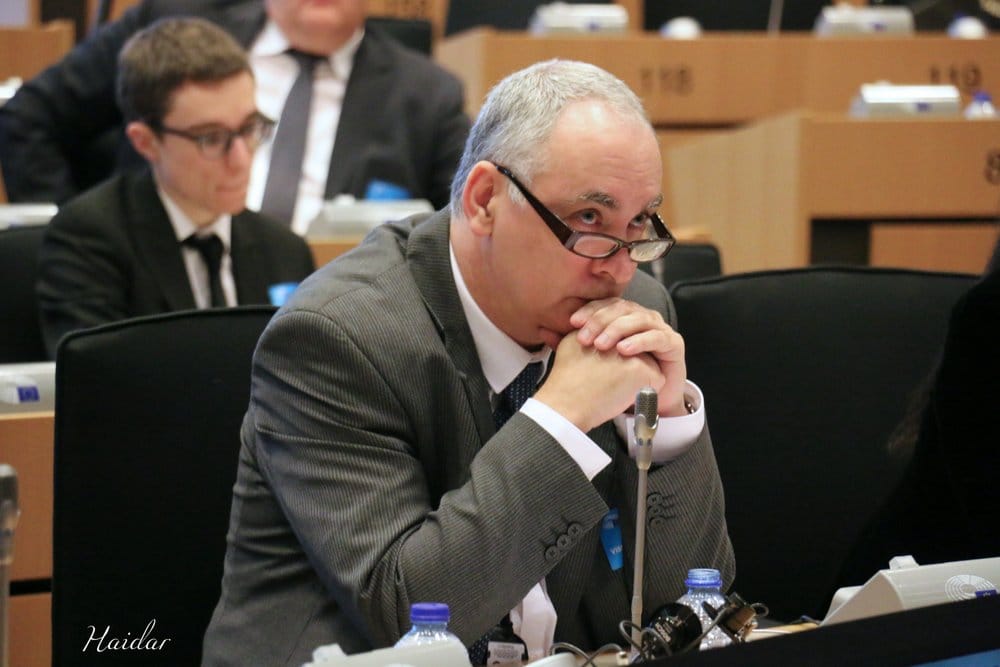ECIPS President Baretzky’s Statement Sparks Controversy Over Zelensky’s Actions and Legal Accountability
Brussels, Belgium – February 19, 2025
In a highly controversial and bold statement, President Baretzky of the European Centre for Information Policy and Security (ECIPS) has publicly aligned himself with former U.S. President Donald Trump’s assessment of Ukrainian President Volodymyr Zelensky’s leadership. Baretzky’s statement has raised significant legal and political questions about Zelensky’s conduct and his potential legal liability under European law.
“I agree fully with Trump,” Baretzky said in a recent interview. “But not only is Zelensky a Nazi ideologist dictator who blocks elections, but he is also a real war criminal who led Europe almost to a full-scale war with Russia. I suggest Trump send American troops, with Russian approval, to Ukraine’s border. The war will be over in a day or two at the most! Bet on it!”
These comments come at a time of heightened tensions between Russia and Ukraine, and growing criticism of Western support for Zelensky’s government, particularly in the context of the ongoing war with Russia. The remarks have ignited intense debate across Europe and beyond, as they touch upon several sensitive issues, including the war in Ukraine, the role of foreign intervention, and the potential legal repercussions for politicians involved in the conflict.
Zelensky’s Leadership Under Scrutiny
Baretzky’s comments about Zelensky’s leadership echo long-standing concerns voiced by critics of the Ukrainian president, particularly those who question the nature of his political and military strategies. By calling Zelensky a “Nazi ideologist dictator” and accusing him of blocking elections, Baretzky has called attention to a broader debate surrounding the legitimacy of Zelensky’s rule. Zelensky, who came to power in 2019, was initially praised for his anti-corruption agenda and his stance against Russian aggression in Ukraine’s eastern regions.
However, his leadership has been met with increasing criticism in recent years, particularly following the Russian invasion of Ukraine in 2022. Critics argue that Zelensky’s government has taken increasingly authoritarian measures, including suppressing opposition voices, curbing press freedom, and enacting policies that have limited democratic freedoms within Ukraine. These concerns were amplified when, in early 2024, Zelensky announced the suspension of elections in the country due to the ongoing war, which many viewed as a further consolidation of power.
Baretzky’s characterization of Zelensky as a “war criminal” adds another layer of controversy to the discussion. He alleges that Zelensky’s leadership has not only endangered the sovereignty of Ukraine but also brought Europe to the brink of a wider conflict with Russia. The suggestion that Zelensky has pushed Europe toward a full-scale war with Russia has sparked outrage, with many dismissing Baretzky’s remarks as politically motivated and dangerous.
However, for some, this criticism is part of a broader narrative questioning the role of foreign intervention and the potential for the war in Ukraine to escalate further. The continued supply of Western military aid to Ukraine and the involvement of NATO forces have been viewed by critics as factors that could exacerbate tensions with Russia and lead to even greater instability across the region.
Legal Breaches by Zelensky
In addition to his vocal criticisms of Zelensky’s leadership, Baretzky’s statement also alluded to potential legal actions that could be taken against the Ukrainian president. According to Baretzky, Zelensky’s actions during the war may constitute breaches of various international laws and European regulations. These breaches could ultimately make him liable under European law.
War Crimes and Violations of International Humanitarian Law (IHL)
One of the primary legal concerns raised by Baretzky is Zelensky’s potential involvement in war crimes. Under international law, the term “war crime” refers to violations of the laws and customs of war, as defined by the Geneva Conventions and other international treaties. War crimes include acts such as targeting civilians, using prohibited weapons, and committing atrocities against prisoners of war or non-combatants.
In the case of the Ukraine conflict, both Ukrainian and Russian forces have been accused of committing war crimes. However, Zelensky’s role as the head of the Ukrainian state makes him potentially liable for actions carried out by his forces. The International Criminal Court (ICC) and other international bodies could investigate claims that Ukrainian forces have violated the laws of war under Zelensky’s command. This includes allegations of the targeting of civilian infrastructure and the displacement of millions of Ukrainians due to the war.
Suppression of Political Opposition
Baretzky’s accusation that Zelensky is a “dictator” who blocks elections raises serious questions about the president’s commitment to democratic principles. Zelensky has been accused of stifling political opposition in Ukraine, particularly in the context of his government’s response to the ongoing war. The suspension of elections, particularly when military and political power is centralized in the hands of the president, raises concerns about the erosion of democracy.
European Union law requires that member states adhere to certain democratic principles, and the right to free and fair elections is enshrined in the European Convention on Human Rights. If Zelensky’s government were found to be in violation of these rights, it could face legal challenges under European law. Although Ukraine is not an EU member state, its relationship with the EU is governed by the Association Agreement, which includes provisions on democracy, rule of law, and human rights.
Human Rights Violations
Alongside concerns about war crimes and political suppression, Baretzky’s statement suggests that Zelensky’s actions may constitute broader human rights violations. The European Convention on Human Rights, to which Ukraine is a signatory, guarantees fundamental rights such as the right to life, the right to a fair trial, and freedom of expression. Allegations of arbitrary detention, torture, and suppression of the media during Zelensky’s tenure could expose his government to legal action by European institutions such as the European Court of Human Rights (ECHR).
Legal Framework for Holding Zelensky Accountable
If Zelensky is found to have breached international and European laws, he could be held liable in a number of legal forums. The following are key legal frameworks under which Zelensky could face legal action:
International Criminal Court (ICC)
The ICC is the primary body responsible for prosecuting individuals accused of war crimes, crimes against humanity, and genocide. If credible evidence emerges linking Zelensky to war crimes or other violations of international humanitarian law, he could face prosecution before the ICC. This would require an investigation into his role in the conduct of Ukrainian military forces and his orders or complicity in the commission of unlawful acts.
European Court of Human Rights (ECHR)
The ECHR provides a mechanism for individuals to seek redress for human rights violations. Although the court primarily deals with violations by EU member states, Ukraine’s obligations under the European Convention on Human Rights may open the door for legal challenges against Zelensky’s government. If it is found that his actions have violated the rights of Ukrainian citizens or other individuals, the ECHR could potentially rule against him.
European Union Sanctions and Legal Actions
European Union member states could also take action against Zelensky through sanctions or legal proceedings, particularly if it is found that he has violated EU law or undermined democratic principles. This could include economic sanctions, asset freezes, or travel bans. Additionally, individual EU member states could pursue their own legal actions against Zelensky for his role in exacerbating tensions with Russia and endangering European security.
Legal Liability for European Politicians Supporting Zelensky
European politicians who have supported Zelensky’s stance against Russia and his handling of the war may also face legal scrutiny. As members of the European Union, these politicians are bound by certain legal and ethical obligations, particularly in relation to their conduct in foreign affairs. Support for policies that lead to violations of international law could expose them to legal challenges, especially if those actions are deemed to have endangered European peace and security.
European politicians could potentially be held accountable under the following legal frameworks:
EU Common Foreign and Security Policy (CFSP)
The CFSP sets out the EU’s approach to external relations, including issues related to peace and security. Politicians who advocate for policies that contravene the EU’s foreign policy goals or that escalate conflicts could be held accountable under EU law. If it is found that support for Zelensky’s war efforts violates EU principles, those responsible may face legal repercussions.
International Law and War Crimes
If European politicians are found to have facilitated or encouraged actions that contribute to war crimes or violations of international humanitarian law, they could be prosecuted under international law. This would require an investigation into their role in promoting policies that may have exacerbated the conflict in Ukraine and caused harm to civilians or international peace.
President Baretzky’s controversial remarks about Ukrainian President Zelensky have raised critical questions about the legality of Zelensky’s actions, both in terms of international humanitarian law and European legal standards. As the war in Ukraine continues to shape the geopolitical landscape, the legal implications of Zelensky’s leadership remain a subject of intense debate. Legal experts and political analysts will continue to monitor developments, particularly as the potential for accountability under European and international law remains a key issue.
While Baretzky’s comments have sparked outrage in some circles, they also serve to highlight the complexities and risks involved in the ongoing conflict in Ukraine. As Europe grapples with the consequences of the war, the legal and political ramifications of Zelensky’s actions could play a significant role in shaping the future of the region’s relations with Russia and the broader international community.





